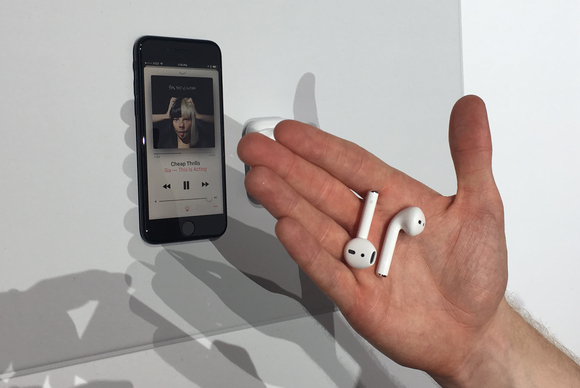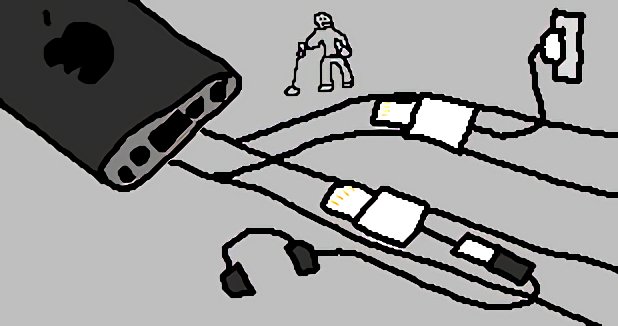callan \ blog
| courage
september 12, 2016
There was this commercial for the Playstation 2 that aired sometime in the early 2000s, featuring the "Playstation 9, new for 2078" - complete with inhalable video spores and telepathic personal music. In a very Matrixian 60-second spot, our hero virtually battles his way through a just-add-water dystopian cityscape teeming with Agent Smith-esque attack drones all while presumably standing on his roof deck in Manhattan.
Introducing the Sony Playstation 9.
With today's clunky, nauseating VR headsets, mixed-reality safety goggles, unreliable Wi-Fi, and shoddy voice recognition engines, we're not exactly living the dream. But hey, we're still got another 62 years to figure it out.
As was widely reported in the past few days, Apple unveiled the iPhone 7 at its September 7 event. And the big reveal, rumored for months, was the removal of the analog 1/8-inch headphone jack in lieu of connecting audio devices and other peripherals via wireless-enhanced Bluetooth (whatever the eff that means) or the company's proprietary lightning connector. With striking hubris, Apple's marketing chief Phil Schiller described this design decision as an act of "courage." The tech press and beyond have already grilled him thoroughly for the grandiosity and self-aggrandizement of this comment. Devin Coldewey wrote on TechCrunch:
"I think it was courage (and self-interest) that made [Apple] fight the FBI the way it has. It was courageous to come out in favor of marriage equality and other civil rights issues. Removing the headphone jack from the iPhone is not an act of courage, it’s an act of leverage."
Coldewey goes on to explain - and his thoughts are echoed at The Verge, Mashable, and The Guardian, just to name a few - that Apple is using its gargantuan market share and corporate cult of personality to force people to use devices they're trying to sell through their subsidiary music company, Beats. Beats is the market leader in Bluetooth headphone sales, and that domination is assured as they plan to sell three new models to coincide with the iPhone 7's release. This isn't courage, this is lock-in - or as Coldewey writes, "it’s not a conspiracy theory, it’s a business plan."
What piqued me about Schiller's comment, aside from how easy it is to ridicule, is how it varies from the traditional failure narrative that's become Silicon Valley kitsch and is now creeping out to the rest of the professional world. "Courage" is not the same as "fail fast, fail often," the dictum peddled by design giant IDEO and many others. "Courage" is about coming out swinging rather than the lessons you might have learned from past mistakes.
Though I've never owned an iPhone and don't have plans to change that, I do have a detached fascination with Apple and the cult and culture that's surrounded the company for decades now, and with the self-mythologizing absurdity that defines most of their neighbors in the Valley. I tried to find coverage of the headphone decision and the release event that took the long view, going beyond the present spectacle of Sia (see below) and Carpool Karaoke and instead positioning this choice in the context of the recent past and the desired future. I learned this isn't Apple's first foray into pushing Bluetooth headsets and that they're widely credited with the inclusion of the 3.5mm jack on smartphones to begin with, the first iPhone rising as it did from the form of the iPod Touch. Before the iPhone appeared, almost no mobile phones sported these jacks; they weren't music-listening devices. (Props to last week's mashup of The Vergecast and Ctrl+Walt+Delete podcasts for that insight.)

@CaseyNewton: "When u finally realize the headphone jack is gone forever"
The future vision is easy enough to see. The first step toward the PS9 experience is to imagine a world without wires. And it's easy enough to get on board with that. Wires are a pain in the ass. They add bulk, get tangled around and stuck on things, and restrict your range of motion. I don't mind them, probably in part because I've used them for over 20 years, but then I compare it to how much less shitty it is to use Wi-Fi on a laptop instead of contending with a LAN cable, and I get it. Of course we won't have wires one day, just like we've mostly jettisoned disk drives, corded home telephones, Flash support, and backward compatibility for Netscape Navigator. But "one day" isn't today, and that means we've got a lot of muddling through to do.
It's too early to say if the iPhone 7 will sink or swim (at least it's more waterproof now!), and it's probably safe to assume we'll get to a much more wireless world eventually. But we need desirable workarounds to get us through the coming years, and that means we need innovation, and innovation will be hard when companies need to go through Apple to get licenses for building that tech. This phase is the messy middle: post-courage, pre-failure. It's going to be an unsexy and annoying time for manufacturers and users alike. The new AirPod headphones cost $160 a pair and look like they've been intentionally designed to pop out of place, never to be seen again, while you're running or on the subway or walking up the stairs at work or even just sitting on the couch. They're transitional tech. We don't have Bluetooth-enabled implants in our ear canals or eye sockets yet (or, well, most of us don't), so until we meld with our gadgets in a more flesh-and-blood sense, we're gonna need some kind of pain-in-the-ass peripheral, most likely chock full of proprietary Apple components.

Those iconic white earbuds, now liberated. (Photo credit: Macworld)
Tech companies are no exception to the human tendency to ignore or downplay the messy middles when telling stories. I'm reading Brené Brown's Rising Strong right now, a book about engaging with the uncomfortable, unpredictable midpoints of our trials in life - whether we're talking tough projects at work, parenting problems, failures to communicate, or romantic letdowns. She calls this phase "the rumble" and encourages us to stay present, alert, and curious during it instead of numbing or trying to will ourselves past it and jump immediately to a solution. Companies like Apple do this, I'm sure, but they don't show it publicly. Behind the closed doors of the engineering labs and the C-suite, they're internalizing and assessing their missteps and sales flops but getting on stage with sanitized tales of courage and failure, as if these things are the two ends of a perfectly linear continuum and there's nothing worth acknowledging in between.
Would users feel less irritated and vexed by the iPhone 7 if it had been presented with less arrogance and self-congratulation? Would it have felt less hostile and Borg complex-y (i.e., "resistance is futile"), or less like the latest round in the planned obsolescence game? Would there have been a warmer reception if Apple had acknowledged the peaks and valleys, the paved cowpaths, the progressive enhancements that define progress in tech? It's hard to say because it's not the company's style, nor really any company's style, to question its questionable choices in public. All anyone hears about at these events is the bravery preceding a risky decision and held onto through the fallout. Courage myths and failure myths. But the messy middles aren't a new thing to design teams or innovators, especially when it comes to consumer electronics and the experience and usage standards of the Web. Companies and customers know them well. I found myself a bit more willing to cut Apple some slack when I thought about the missing headphone jack within the context of both the company's past and present and the PS9-style seamless device integration we may get to one day. I'm not saying I want to inhale my infotainment system, but I doubt I'll miss wires when I no longer need them.
In the meantime, it'd be great to see a tech company that welcomes us end-user peons along as we muddle through together instead of sending us zooming on autopilot down whatever smooth superhighway it thinks is best for us. What actually does take courage is to stay open to feedback and criticism and nice-to-haves and need-to-haves, to listen to and include those things in the interest of creating a better experience. But even though we're fundamental to the business model and ultimately do get to vote with our dollars, mere mortals like us aren't likely to be looped in as partners, particularly when our powerlessness stands to drive up profits. Maybe the middle doesn't matter when the goal is to force everybody into a vertically integrated proprietary hellscape.
Have fun playing with your dongles, I guess.
